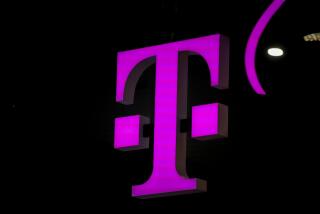Cingular Wins Bid for AT&T; Wireless
- Share via
After a four-week courtship and a whirlwind weekend, AT&T; Wireless Services Inc. agreed Tuesday to join Cingular Wireless in a $41-billion cash deal that would create the nation’s largest mobile phone company.
Cingular’s acquisition of AT&T; Wireless would reduce to five the number of major players in the cutthroat industry, a consolidation analysts said could lead to more stable profits, possibly at the expense of customers.
The two regional Bell companies that own Cingular -- SBC Communications Inc. and BellSouth Corp. -- would have nearly 30% of the nation’s cellphone customers, overtaking longtime market leader Verizon Wireless.
If AT&T; Wireless shareholders and federal regulators approve the deal, it “will mean better coverage, improved reliability, enhanced call quality and a wide array of new and innovative services for consumers,” said Cingular Chief Executive Stan Sigman.
Added AT&T; Wireless Chairman John D. Zeglis: “After today, nothing is going to be quite the same in the wireless industry.”
Investors hope so.
The union should spark long-awaited consolidation in the low-margin wireless industry, something urged by Wall Street and dreaded by consumer groups.
“It’s a step in the right direction,” said Tom Friedberg, an analyst at Janco Partners Inc. in Denver. “But it won’t be as easy for other consolidations as this one is.”
Cingular and AT&T; Wireless use the same technology. Their networks and coverage complement each other more than overlap. And as the first major wireless firms to seek to combine, analysts figure, their deal will face fewer antitrust objections than a merger that would bring the industry down to just two or three major carriers.
With five major wireless companies left, Friedberg and others said customers would still benefit from stiff competition and low prices.
Consumers Union called the deal a “lose-lose proposition for consumers.”
“A move toward greater consolidation cuts at the heart of this growing competition in the telephone marketplace,” said Chris Murray, legislative counsel for Consumers Union, which publishes Consumer Reports magazine. “We can expect to see fewer deals and higher prices, just as we’ve seen with the mergers of cable companies.”
Since it was spun off from AT&T; Corp. four years ago, AT&T; Wireless has been a rumored takeover target a number of times, including attempts by Cingular, according to sources. Cingular is 60%-owned by SBC, California’s dominant local phone company, and 40%-owned by BellSouth.
Last month, Cingular reportedly made an unsolicited offer of $23 billion to $27 billion that forced AT&T; Wireless to put itself up for sale. Longtime shareholder NTT DoCoMo Inc., which owns 16%, bowed out of the bidding early. But Britain’s Vodafone Group ended up being the only other bidder, matching Cingular’s rising offers throughout the weekend.
Zeglis said AT&T; Wireless board members were holed up for 72 hours in lawyers’ offices over the Valentine’s Day weekend negotiating between Vodafone and Cingular. Vodafone had the edge late Monday, but Cingular delivered a proposal about 2:30 a.m. Tuesday that Zeglis called “eye popping.”
Under terms of the deal, Cingular would pay $15 a share, a 27% premium over Redmond, Wash.-based AT&T; Wireless’ Friday closing price of $11.82 on the New York Stock Exchange. Shares rose $1.96 to $13.78 on Tuesday. SBC shares fell 18 cents to $24.87 and BellSouth shares dropped 49 cents to $29.06 on the NYSE.
The company would be called Cingular and its headquarters would remain in Atlanta.
SBC would provide about $25 billion in financing; BellSouth about $16 billion. In addition, Cingular would assume $4.3 billion of AT&T; Wireless debt. The deal is expected to close in the last quarter of this year.
At the end of 2003, SBC had $4.8 billion in cash; BellSouth had $4.5 billion.
Financing the purchase shouldn’t drain them. “I don’t think they would have done this merger if it had foreclosed other options,” analyst Jonathan Atkin of RBC Capital Markets in San Francisco said.
Friedberg of Janco Partners said a Vodafone victory would have been disastrous for wireless stocks because “all the industry would have is a stronger competitor for the same market share. Vodafone might have wanted this company, but Cingular needed it.”
Few expect Verizon Wireless to remain No. 2 for long. “By this time next year, Verizon has a good chance of being No. 1 again just from their internal growth,” said Ken Hyers, analyst at In-Stat/MDR research firm in Boston. “Verizon Wireless is an enormous juggernaut.”
Cingular’s Sigman said the combined operation expected to save $1 billion in 2006 and $2 billion a year starting in 2007 as it melds back office systems and billing and closes duplicate store locations nationwide.
Sigman wouldn’t comment on how many of the 71,000 combined employees would be fired. Analysts expect a significant number would go.
The $41-billion cash deal sparked a different kind of criticism from AT&T; and the CompTel/ASCENT Alliance, the trade group for Baby Bell rivals. They charge that the Bells can no longer be believed when they complain about the expense of deploying high-speed fiber-optic cable without regulatory relief and the expense of providing their equipment and lines to competitors at regulated wholesale prices.
“This should serve as a wake-up call to regulators,” said James Cicconi, AT&T;’s general counsel. “The Bells are not being bled dry by [wholesale pricing], and they do not need regulatory relief to invest in advanced services. Their choices to invest are contrary to their rhetoric, but their motives are clear: They want to kill competition at all costs.”






